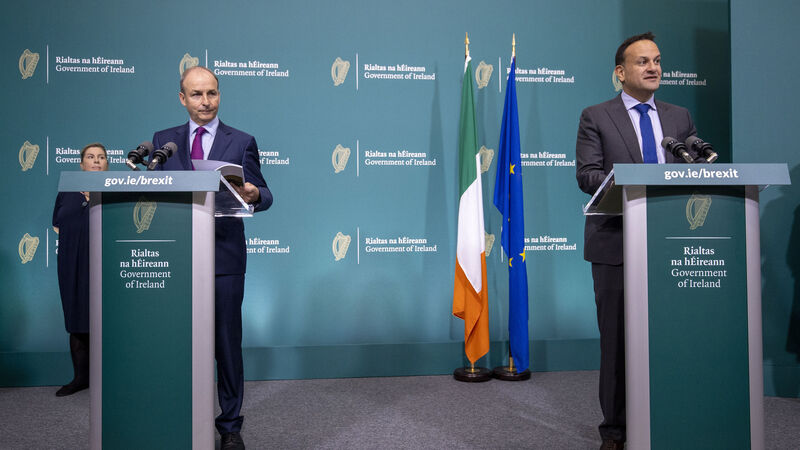Q&A: Why is Brexit back on the agenda?

Taoiseach Micheal Martin and Tanaiste Leo Varadkar pictured at a briefing announcing the Government today approved its 2020 Brexit Readiness Action Plan. Picture: Julien Behal Photography.
The deadline for the UK's exit from the EU is January 1, and time is running out for Irish businesses to prepare for the changes that will follow.
This week, the UK government said it is drafting legislation that will override key elements of the Brexit deal agreed with the EU, in breach of international law.
The Internal Market Bill would allow the UK to "dis-apply" the agreed legal framework which gives EU law supremacy over the UK in areas covered by the Withdrawal Agreement.
Under the Withdrawal Agreement, Northern Ireland will stay part of the EU single market for goods in order to avoid creating a hard border.
Talks over a post-Brexit trade deal are still ongoing, and the UK and EU are negotiating how these new customs checks will be implemented.
The Government’s Brexit Readiness Action Plan lays out the "profound" changes that are going to take place as a result of Brexit and the steps Irish businesses should take.
The Action Plan provides guidance and advice to business and individuals in areas, including the trade in goods and services, customs processes, import duties, EU single market accreditations, use of the UK land bridge, retail trade, the transfer of data, the movement of pets, recognition of qualifications, and other issues which will arise at the end of the transition period. The government is offering grants and training courses for companies who will be affected by Brexit in order to offset some of the financial difficulties.
Businesses will see a raft of changes, especially if they import or export to the UK. Many businesses may have to hire or deploy staff into a customs role, ensuring they have filled out all the necessary and new paperwork that will be needed when exporting to the UK.
In a no-deal scenario, customs tariffs will be applied to exports, a move that will be reportedly "devastating" for the agri-food sector, as the tariffs on agri-food are high. This could devastate Ireland's farming industry as well as having wider ramifications on access to products from the UK, as many businesses may choose not to import from the UK because they can't afford the extra cost.
Travel across the border will remain unchanged, with each of the negotiating partners agreed that there will be no reintroduction of customs or security posts. However, prices, the availability of products, and shopping online is certain to change. Online shopping from the UK will see similar customs fees to that which shoppers currently pay when ordering from the US and China, including customs duty and VAT.
Likewise, if businesses are subject to tariffs in a no-deal scenario, those extra charges will be added to the final price to the customer in order for the business to make up for these losses, and some products could see price hikes.
The Government launched the Brexit Readiness Action Plan today, on the steps businesses and individuals should now take ahead of the end of the Transition Period on 31 December.#BrexitReady @MichealMartinTD @BrexitReadyIRLhttps://t.co/lPlWWc4YYm pic.twitter.com/WIRSsiRYie
— Government of Ireland (@GovIE) September 9, 2020
The provisions of the Withdrawal Agreement and the protocol on Ireland and Northern Ireland still apply. This protects the peace process and avoids a hard border on the island of Ireland, while preserving the integrity of the EU Customs Union and single market.
Under the protocol, the single market will continue to apply to and in Northern Ireland. This ensures that from Northern Ireland also will have free and open access to the EU Single Market.





